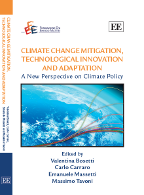Climate Change Mitigation, Technological Innovation and Adaptation

19.06.2014
Valentina Bosetti, Carlo Carraro, Emanuele Massetti and Massimo Tavoni
Edward Elgar, Series on Economics, the Environment and Sustainable Development
This book presents a rigorous yet accessible treatment of the main
topics in climate change policy using a large body of research generated
using WITCH (World Induced Technical Change Hybrid), an innovative and path-breaking integrated assessment model.
The authors give a particular emphasis to the analysis of technological
change necessary to build low-carbon economies. The WITCH model can
track all of the actions which impact the level of mitigation – such as
R&D expenditures, investments in carbon-free technologies and
adaptation, purchases of emission permits, or expenditures for carbon
taxes – thus allowing for the evaluation of equilibrium responses
stimulated by different climate policy tools. The chapters examine
various questions to explore the future of climate change policy. Why is
it so hard to achieve a global agreement that paves the way to
widespread reductions of carbon dioxide and other greenhouse gas
emissions? What are the technologies that would deliver clean energy
without harming economic growth? And finally, how does uncertainty about
future policies and future technologies affect choices in the present?
This innovative book will appeal to researchers, policy makers and academics interested in climate change policy.
Contributors: Valentina Bosetti, Carlo Carraro, Enrica
De Cian, Thomas Longden, Emanuele Massetti, Lea Nicita, Fabio Sferra,
Alessandra Sgobbi and Massimo Tavoni
This book presents a rigorous yet accessible treatment of the main topics in climate change policy using a large body of research generated using WITCH (World Induced Technical Change Hybrid), an innovative and path-breaking integrated assessment model.
The authors give a particular emphasis to the analysis of technological change necessary to build low-carbon economies. The WITCH model can track all of the actions which impact the level of mitigation – such as R&D expenditures, investments in carbon-free technologies and adaptation, purchases of emission permits, or expenditures for carbon taxes – thus allowing for the evaluation of equilibrium responses stimulated by different climate policy tools. The chapters examine various questions to explore the future of climate change policy. Why is it so hard to achieve a global agreement that paves the way to widespread reductions of carbon dioxide and other greenhouse gas emissions? What are the technologies that would deliver clean energy without harming economic growth? And finally, how does uncertainty about future policies and future technologies affect choices in the present?
This innovative book will appeal to researchers, policy makers and academics interested in climate change policy.
Contributors: Valentina Bosetti, Carlo Carraro, Enrica De Cian, Thomas Longden, Emanuele Massetti, Lea Nicita, Fabio Sferra, Alessandra Sgobbi and Massimo Tavoni
